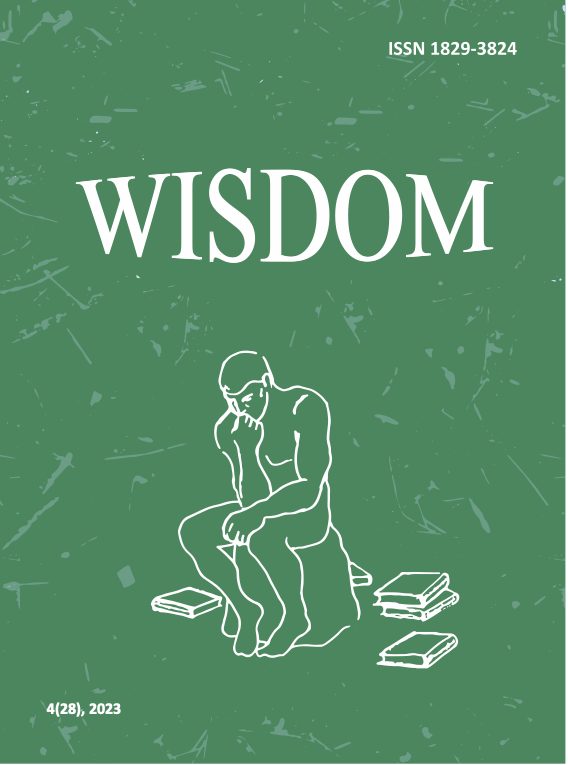On the Dialogue of Aesthetics and Philosophical Anthropology
DOI:
https://doi.org/10.24234/wisdom.v10i1.197Keywords:
aesthetics, philosophical anthropology, aesthetics of spatiality, Wolfgang Welsch, Richard Shusterman, Helmuth Plessner, Joseph Margolis, Arnold BerleantAbstract
After the alleged ‘ends’ of metaphysics, of history, and of art, aesthetics reorganises the field of its enquiry. While retaining the question of the meaning of art for the human as the background justification of its theorising, aesthetics meets philosophical anthropology and enlarges its field. Philosophical anthropology explains that the instability of the human condition demands culture as the artificial stabilisation of the human world as well as of the human in the world. Expressivity, artificiality, and the aesthetic are interweaved with the meaning of the human world. In this context, pictures have priority over concepts and justify art as the eminent pictorial form of meaning. Since the human lives in nature and culture, the stabilisation of its open world is possible through creation of spatial correlates and of objects as well. Thus, aesthetics does need to expand enquiry beyond the discourse on art, so that it includes the issues concerning the aesthetic character of the human world and its spatial correlates. While Wolfgang Welsch and Richard Shusterman argue for a revision of aesthetics, Joseph Margolis and Helmuth Plessner support the stronger dialogue between philosophical anthropology and aesthetics in different ways. Further, Arnold Berleant explores aesthetics of human space.
Downloads
References
Apostolopoulou, G. (2003). Welterfahrung und Kunsterfahrung. In ?. Gloy (Ed.), Kunst und Philosophie (pp. 43-59). Wien: Passagen Verlag.
Apostolopoulou, G. (2004). The Aesthetics of Environment as Aesthetics of the Human Space. Arnold Berleant’s Contribution. In A. Berleant, Aesthetics of Environment (pp. 335-358, in Greek). Athens: Panayotis and Effie Michelis Foundation.
Berleant, A. (1995). Aesthetics of Environment. Philadelphia: Temple University Press.
Berleant, A. (2004). Aisth?tik? tou periballontos. (Aesthetics of Environment, in Greek) (M. Antonopoulou, & N. A. N. Gkogkas, Greek Trans.; G. Apostolopoulou, Scientific Supervision and Postscript). Athens: Panayotis and Effie Michelis Foundation.
Bielefeldt, H., Brugger, W., & Dicke, K. (Eds.) (1988). Dimensionen menschlicher Freiheit. Johannes Schwartländer zum 65. Geburtstag. Tübingen: Attempto Verlag.
Fischer, J. (2008). Philosophische Anthropo¬logie. Eine Denkrichtung des 20. Jahrhunderts. Freiburg / München: Verlag Karl Alber.
Gkogkas, N. (2007). Aesthetics and the Environment. Repatriating Humanity. Contemporary Aesthetics, 5(1), Retrieved May 30, 2018, from: https://digitalcommons.risd.edu/liberalarts_contempaesthetics/vol5/iss1/4/
Gloy, K. (Ed.) (2003). Kunst und Philosophie. Wien: Passagen Verlag.
Krüger, H.-P. & Lindemann, G. (Ed.) 2001. Philosophische Anthropologie im 21. Jahrhundert. Berlin: Akademie Verlag.
Margolis, J. (2009). The Arts and the Definition of the Human. Towards a Philosophical Anthropology. Stanford: Stanford University Press.
Plessner, H. (1981a). Die Einheit der Sinne. Grundlinien einer Aesthesiologies des Geistes. In: H. Plessner, Gesammelte Schriften, Vol. 3. Frankfurt a. M.: Suhrkamp.
Plessner, H. (1981b). Die Stufen des Organischen und der Mensch. Einleitung in die philosophische Anthropologie. In: H. Plessner, Gesammelte Schriften, Vol. 4. Frankfurt a. M.: Suhrkamp.
Plessner, H. (1981c). Ausdruck und menschliche Natur. In: H. Plessner, Gesammelte Schriften, Vol. 7. Frankfurt a. M.: Suhrkamp Verlag.
Shusterman, R. (2000). Pragmatist Aesthetics. Living Beauty, Rethinking Art. Lanham: Rowman & Littlefield Publishers.
Shusterman, R. (2008). Body Consciousness: A Philosophy of Mindfulness and Somaesthetics. Cam-bridge: Cambridge University Press.
Shusterman, R. (2012). Thinking through the Body: Essays in Somaesthetics. Cambridge: Cambridge University Press.
Welsch, W. (1993). Ästhetisches Denken. Stuttgart: Philipp Reclam.
Welsch, W. (2012). Blickwechsel. Neue Wege der Ästhetik. Stuttgart: Philipp Reclam.
Downloads
Published
How to Cite
Issue
Section
License
Creative Commons Attribution-Non-Commercial (CC BY-NC). CC BY-NC allows users to copy and distribute the article, provided this is not done for commercial purposes. The users may adapt – remix, transform, and build upon the material giving appropriate credit, and providing a link to the license. The full details of the license are available at https://creativecommons.org/licenses/by-nc/4.0/.














